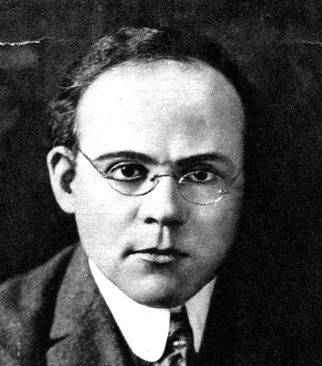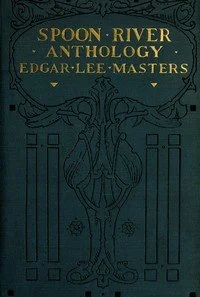The Poetry of Small-Town America
Brenna Chatterton - The Forgottonia Times™
"Once in a while a man comes along who writes a book that has his own heart-beats in it…The people whose faces look out from the pages of the book are the people of life itself, each trait of them as plain or as mysterious as in the old home valley where the writer came from. Such a writer and book are realized here." - Carl Sandburg, the Little Review.
Edgar Lee Masters was born in 1868 in Garnet, Kansas, and raised on his grandfather's farm in New Salem, Illinois. He is the author of 40 books of prose and poetry, but best remembered for his Spoon River Anthology (1915), a collection of over 200 free-verse epigrams detailing the lives of rural Illinois people. He studied in his father's law firm, attended Knox College for one year, and began his successful law practice in Chicago in 1891. Using a pseudonym to avoid any damage to his fortified law career, he published his first verses in 1898, which were quickly followed by a drama in blank verse title Maximillian (1902), The New Star Chamber and Other Essays (1904), Blood of the Prophets (1905), and a series of plays issued between 1907 (Althea) and 1911 (The Bread of Idleness). These pieces were scarcely exceptional; if Masters had continued to write similar verse, he wouldn't have been remembered. In 1909, however, he discovered Epigrams from the Greek Anthology and was taken by the idea of writing free-verse epitaphs in the form of monologues.
During the Hellenistic period (323BCE - 30BCE), the epigram, or a brief, witty, and memorable verse, became an important and outstanding genre of literature. It became increasingly common for epigrams to be put in collections of artfully arranged poems, one of the first being Garland by Meleager, an anthology of as many as one thousand epigrams by himself and forty-six other poets, in the first century BCE. Around the 10th century, however, Constantine Cephalas arranged the Greek Anthology, an outstanding assemblage of Hellenistic literature. In 1909, Edgar Lee Masters read a selection of the epigrams from this collection and was taken with its poignant and often satirical nature. This form of literature aided him well for the confessional anthologies he would go on to write about the people of Spoon River.
The Spoon River Anthology, published in 1915, was a national success. It immediately caused great disruption because of its forthrightness about sex, moral decay, and hypocrisy in the small towns near Spoon River. Many people were extremely offended by Master's opinion of his childhood home, yet it also inspired an entire generation of writers to alter their view of small towns as the bastion of American life and values. Masters was blunt; yet he was so honest with the universal themes of depravity and grief, that the whole nation sympathized with his Anthology. He wrote of the hatred found in many marriages, abortions, adultery, and other numerous evils. Writing their own epitaphs, his characters look back from their graves, often in melancholy, bitter about their unfulfilled lives. It was a blatant retelling of common types of people seen in struggling American towns, and although it was popularized for its sex, scandal, and intrigue, it was praised amongst academia for its willingness to expose the truth in a classic and charming way. "At last. At last America has discovered a poet," rejoiced fellow poet Ezra Pound in The Egoist. "At last the American West has produced a poet strong enough to weather the climate, capable of dealing with life directly, without circumlocution, without resonant meaningless phrases."
Growing up surrounded by Midwestern life, Masters was firmly planted in the culture he both praised and criticized. He created a duly witty yet genuine commentary, combining classical and modern forms of poetry. The confessions Masters wrote for his dead citizens of the Spoon River were written in free verse, a style pioneered by Walt Whitman, but still ill-accepted by the popular literary world. Novelist William Dean Howells, writing in Harper's, regarded Masters's work as nothing but "shredded prose." However, many regarded Masters as a pioneer of American literature to carry on the likes of Whitman. He was a "master" storyteller, and created characters that resonated in incredible ways, disclosing truths that many were warranted to withhold. The June 1915 Poetry: A Magazine of Verse affirms just how extraordinary Masters' work was for a time that was poetically dry: "It is a significant fact that Mr. Frost has made the characters of a New England community, and Mr. Masters the characters of a little Illinois town, live for us as no American novelist has done since Hawthorne. They have created not "types," but human beings. This is the secret of Mr. Masters' method. In revealing the crisis of each individual life in Spoon River, he reveals the soul of the community."
The Spoon River near Smithfield, IL
Unfortunately, Master's work would never again reach the exceptionality of the Spoon River Anthology. He deliberately continued to write until near his death in 1950, but progressively got more and more political with his literary voice. He wrote two novels, multiple biographies, including Lincoln the Man, 1931, (in which Masters' attacks on Lincoln were poorly received by critics and historians), and an autobiography, Across Spoon River (1936).
Nonetheless, Masters was a pioneer of the true American poet. His epigraphic approach, brilliant storytelling, and honest themes led him to a valiant success with the Spoon River Anthology. He brought to a vivid life the adversities faced by these people, never romantic, but drenched in reality. He revealed lessons learned from a life wasted; namely, that life itself is greatly treasured.
"It is simply the sense of the tragedy of broken and wasted lives- of unnecessarily wasted lives. For in spite of death and defeat, Mr. Masters makes life seem precious. Humorous, squalid and noble at the same time, an affair of broken wings, splendid hopes, drag-gled aspirations, and smothered beauty, life is yet too amazingly vital to be discarded even by those who have themselves taken the final step to discard it! These people who are dead love life and remember it with regret. Not all of these people, indeed, as one shrewdly suspects, have yet gained the secure repose of the hill at Spoon River!" (The June 1915 Poetry: A Magazine of Verse)
The Hill
Edgar Lee Masters
Where are Elmer, Herman, Bert, Tom and Charley,
The weak of will, the strong of arm, the clown, the boozer, the fighter?
All, all are sleeping on the hill.
One passed in a fever,
One was burned in a mine,
One was killed in a brawl,
One died in a jail,
One fell from a bridge toiling for children and wife —
All, all are sleeping, sleeping, sleeping on the hill.
Where are Ella, Kate, Mag, Lizzie and Edith,
The tender heart, the simple soul, the loud, the proud, the happy one? —
All, all are sleeping on the hill.
One died in shameful child-birth,
One of a thwarted love,
One at the hands of a brute in a brothel,
One of a broken pride, in the search for heart's desire,
One after life in far-away London and Paris
Was brought to her little space by Ella and Kate and Mag —
All, all are sleeping, sleeping, sleeping on the hill.
Where are Uncle Isaac and Aunt Emily,
And old Towny Kincaid and Sevigne Houghton,
And Major Walker who had talked
With venerable men of the revolution? —
All, all are sleeping on the hill.
They brought them dead sons from the war,
And daughters whom life had crushed,
And their children fatherless, crying —
All, all are sleeping, sleeping, sleeping on the hill.
Ollie McGee - Edgar Lee Masters
Have you seen walking through the village
A Man with downcast eyes and haggard face?
That is my husband who, by secret cruelty
Never to be told, robbed me of my youth and my beauty;
Till at last, wrinkled and with yellow teeth,
And with broken pride and shameful humility,
I sank into the grave.
But what think you gnaws at my husband's heart?
The face of what I was, the face of what he made me!
These are driving him to the place where I lie.
In death, therefore, I am avenged.



